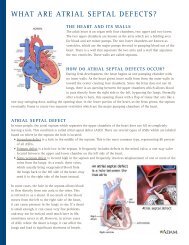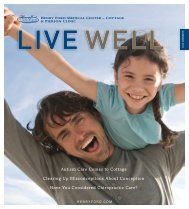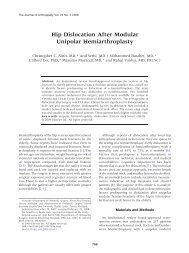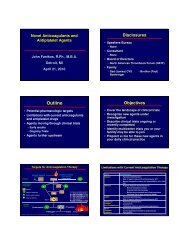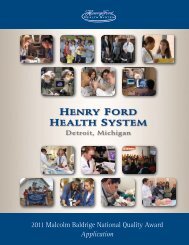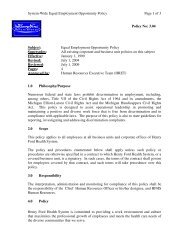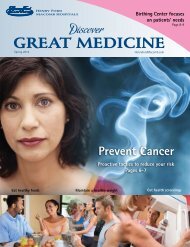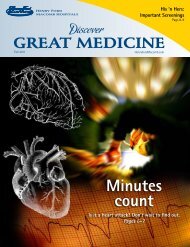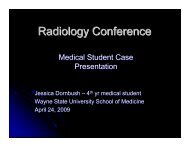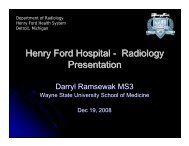Fall 2010 - Henry Ford Health System
Fall 2010 - Henry Ford Health System
Fall 2010 - Henry Ford Health System
- No tags were found...
You also want an ePaper? Increase the reach of your titles
YUMPU automatically turns print PDFs into web optimized ePapers that Google loves.
<strong>Fall</strong>/Winter <strong>2010</strong>Vol. 24, No. 3For members of the <strong>Henry</strong> <strong>Ford</strong> Medical Association,<strong>Henry</strong> <strong>Ford</strong> Physicians, Residents and AlumniMessage from the PresidentIf you did not attendthe recent 95th<strong>Henry</strong> <strong>Ford</strong> MedicalAssociation JubileeReunion on Oct.21-23, you misseda great opportunityfor fellowship,education, tours ofour newest and mostinnovative centersand a wonderfulbanquet.Dr. Lawrence MitchellEvents began Thursday evening witha welcome reception at The <strong>Henry</strong> inDearborn (formerly known as The Ritz-Carlton). This provided attendees anopportunity to reacquaint themselveswith old friends and colleagues, andmingle with fellow alumni whose careersat <strong>Henry</strong> <strong>Ford</strong> Hospital dated as farback as 1948. Although the stories andfacilities may have been different, thepride and enthusiasm for <strong>Henry</strong> <strong>Ford</strong> wasunchanged.<strong>Henry</strong> <strong>Ford</strong> Hospital Performs Michigan’s firstintestine transplantMultivisceral transplantation, whichincludes a combination of digestivesystem organs – the stomach, pancreas,intestine, duodenum and liver, is now beingperformed by surgeons at the <strong>Henry</strong> <strong>Ford</strong>Transplant Institute, located at <strong>Henry</strong> <strong>Ford</strong>Hospital in Detroit.Only a few centers in the United States offerintestine transplantation, and <strong>Henry</strong> <strong>Ford</strong> isthe only one in Michigan with a program.A team led by Marwan Kazimi, M.D., andMarwan Abouljoud, M.D., performed thestate’s first intestine transplant in August.During the 11-hour surgery, a 50-year-oldmale patient, with short bowel syndromeand insulin-dependent diabetes, received adeceased donor’s small bowel, stomach andpancreas.“While still rare, intestine transplant ismuch more successful than in the past, dueto advancements in surgical techniques,improvements in patient selection, andrefinements in our understanding ofimmunosuppression and post-surgicalinfections,” says Dr. Kazimi, director, SmallBowel and Multivisceral Program.Dr. Kazimi explains that patients withintestinal failure are considered candidatesfor transplant when other treatments,such as total parenteral nutrition (TPN),are unsuccessful. The most commoncause of intestinal failure is short bowelsyndrome. Other indications for intestinetransplantation are mesenteric venousthrombosis, irritable bowel or Crohn’sdisease, Gardner’s syndrome, complicationsof gastric bypass or other bowel trauma.Continued on Page 7On Friday, there was an educationalseminar, which centered on thegroundbreaking research and treatmentmodalities currently being performedat <strong>Henry</strong> <strong>Ford</strong>. Featured areas includedadvances in robotic surgery, theNeuroscience Institute, the Edith andContinued on Page 5What’s InsideHermelin Brain Tumor Center - Page 2Advances in robotic surgery forkidney and bladder cancer- Page 3HFHS News & People - Pages 4, 5Program graduates- Page 8, 9In Memoriam - Page 6Jubilee Reunion photos - Page 10<strong>Henry</strong> <strong>Ford</strong> surgeons Marwan Abouljoud, M.D. and Marwan Kazimi, M.D., address themedia about the state’s first multivisceral transplant.
Hermelin Brain Tumor CenterLeadership Profile: Steven Kalkanis, M.D., Co-director, Hermelin Brain Tumor CenterDirector, Neurosurgical Oncology, <strong>Henry</strong> <strong>Ford</strong> West Bloomfield Hospital2Steven Kalkanis, M.D., joined<strong>Henry</strong> <strong>Ford</strong> <strong>Health</strong> <strong>System</strong> in2004. He completed neurosurgeryresidency and fellowship training atMassachusetts General Hospital inBoston and is a graduate of HarvardMedical School. Recently, a Roundseditor had the opportunity to sitdown with Dr. Kalkanis and discussthe brain tumor program at <strong>Henry</strong><strong>Ford</strong>’s Hermelin Brain Tumor Center.Rounds: What brought you to <strong>Henry</strong><strong>Ford</strong> <strong>Health</strong> <strong>System</strong>?Dr. Kalkanis: <strong>Henry</strong> <strong>Ford</strong> is trulya world-class delivery system,on par with Harvard, in myexperience. When it comes totreating brain tumors, <strong>Henry</strong> <strong>Ford</strong>’smultidisciplinary approach –collaboration between neurosurgery,medical and radiation oncology,pathology and others – is greaterthan the sum of its parts. As afounding member of the AdultBrain Tumor Consortium and aparticipant in the Cancer GenomeAtlas, <strong>Henry</strong> <strong>Ford</strong> offers the mostadvanced clinical trials and surgicalapproaches. And Mark Rosenblum,M.D., is an amazing surgeon and agreat chairman and mentor, and Ithought working with him would bea fantastic opportunity.Rounds: In your opinion, where arethe biggest advancements in braintumor treatment?Dr. Kalkanis: The good news isthat in the last 10 years, we havedoubled the number of patients whoare achieving long-term survivalfrom the most aggressive form ofbrain cancer. The most significantadvancement is the advent ofpersonalized medicine. Some of thebiggest strides in this field are beingmade at the Hermelin Brain TumorCenter, under the direction of neurooncologistTom Mikkelsen, M.D. Wehave the second largest tumor tissuebank in the country, second onlyto the National Institutes of <strong>Health</strong>(NIH), and we know how patientshave fared from their treatments10-15 years out. We now have thetools to identify genetic subtypesthat affect how patients will respondto treatment. Dr. Mikkelsen and histeam are developing vectors that canbe injected to manipulate the geneticsubtype so that it is more responsiveto treatment.The other major advancement hasbeen the success of Avastin (anti-VEGF therapy) in reducing diseaseprogression. Our center’s publishedresearch led to FDA approval ofAvastin for recurrent malignantgliomas. We also are makingprogress toward standardizing braintumor treatment, which is all overthe map. Last year I co-authoredrecommendations for the treatmentof metastatic brain cancer, whichis diagnosed in 500,000 peopleeach year. The recommendationswere approved and endorsed by theCongress of Neurological Surgeons,the AANS (American Association ofNeurological Surgeons), and the JointSection on Brain Tumors. They alsohave been well-received by ASTRO(American Society for TherapeuticRadiology and Oncology) and SNO(Society for Neuro-Oncology). Ourrecommendations have gained sometraction in Washington D.C., as ourhealth care system is moving towardbest practices in evidence-basedmedicine.Rounds: What advantages does<strong>Henry</strong> <strong>Ford</strong> offer brain tumorpatients?Dr. Kalkanis: The first is translationalresearch and expediting laboratoryfindings to clinical trials, becausethe one thing we simply don’t havewith these patients is time. We offercutting-edge therapies not foundelsewhere. Also, our multidisciplinaryapproach means that our patientsbenefit from an unparalleled level ofcoordinated care. Our tumor boardarrives at comprehensive, bestpracticetreatment recommendationsfor each patient. Another is ourintra-operative MRI. (See Page 16.)This technology allows us to mapfibers in the brain during surgery, topreserve function and excise moreof the tumor. With brain tumors,literally one cancer cell left behindcan kill a patient. The technologyalso will allow us to conduct laserthermal ablation under the guidanceof intra-operative MRI. This gives usan opportunity to treat deep tumorsthat otherwise would be consideredinoperable. ●For information on the HermelinBrain Tumor Center, go tohenryford.com/braintumors. Tocontact the Referring PhysicianOffice, call 1-877-434-7470or go to henryford.com andclick on “Resources for MedicalProfessionals.”
HFMGPEOPLEAamir Siddiqui, M.D., divisionhead of Plastic Surgery, Departmentof Surgery, has been elected to servea three-year term on the NationalPressure Ulcer Advisory Panel(NPUAP) Board of Directors, January2011-February 2014. The NPUAPprovides multidisciplinary leadership forimproved patient outcome in pressureulcer education, public policy, andresearch.Lei Ren, Ph.D., a senior associatephysicist in the <strong>Henry</strong> <strong>Ford</strong> Departmentof Radiation Oncology, received theBasic Science Abstract Award atthe 52nd annual ASTRO meeting.He was given the award for hisresearch to reduce radiation therapyimaging dose and improve treatmentaccuracy by optimizing use of conebeamcomputed tomography.Michael D. Seidman, M.D.,Department of Otolaryngology-Head & Neck Surgery, was installedas chair of the American Academyof Otolaryngology-Head & NeckSurgery Board of Governors at thegroup’s annual meeting in Boston.The academy represents more than11,000 physicians and allied healthprofessionals who specialize in thetreatment of ears, nose, and throat,and related structures of the headand neck.Nancy Schlichting, president andCEO of <strong>Henry</strong> <strong>Ford</strong> <strong>Health</strong> <strong>System</strong>,has been elected to the board oftrustees for the American HospitalAssociation. Her term beginsJanuary 1, 2011. ●Do you have news for the HFMG People Section?E-mail your 50-word announcement to jperez1@hfhs.org.Tour de <strong>Ford</strong>More than 150 ridersparticipated in the inauguralTour de <strong>Ford</strong> bike event,which was held Sept. 12,<strong>2010</strong>. Riders were able tochoose from a 35- or 67-mileroute that spanned acrossMacomb, Oakland and WayneCounties. Both routes startedand finished at <strong>Henry</strong> <strong>Ford</strong>Medical Center in SterlingHeights and included a stopat <strong>Henry</strong> <strong>Ford</strong> Hospital. Theevent proceeds benefited theTom Groth Patient MedicalNeeds Fund, which providesmedical care and servicesto thousands of uninsuredand underinsured patientsthroughout southeastMichigan. For moreinformation about the 2011Tour de <strong>Ford</strong>, visithenryford.com/tourdeford4
In MemoriamMichael J. Brennan, M.D., former chairman of theDepartment of Hematology and Oncology at <strong>Henry</strong> <strong>Ford</strong>Hospital from1954-66, passed away at his home on Sept.22, <strong>2010</strong>. Dr. Brennan attended medical school at LoyolaUniversity in Chicago and completed his internship andresidency at <strong>Henry</strong> <strong>Ford</strong> Hospital from 1947-51. Hevolunteered and served in World War II as well as in theKorean War, in which he served as base hospital commanderat Fort Monmouth, NJ. After the Korean War, he returnedto Detroit and joined the staff at <strong>Henry</strong> <strong>Ford</strong> Hospital,where he remained until his appointment as president of theMichigan Cancer Foundation, now known as the BarbaraAnn Karmanos Cancer Center. Dr. Brennan also servedas director of the Meyer L. Prentis Comprehensive CancerCenter of Metropolitan Detroit from 1978-87. Additionally,Dr. Brennan was professor emeritus of medicine at WayneState University, lectured frequently at medical symposia,and is credited with numerous published articles and books.Ellet H. Drake, M.D., former headof the Division of Cardiology at<strong>Henry</strong> <strong>Ford</strong> Hospital passed awayJuly 2, <strong>2010</strong>. Dr. Drake was acceptedinto a selective training program in<strong>Henry</strong> <strong>Ford</strong> Hospital’s Departmentof Medicine in 1939; he interruptedhis training to serve as an assistantsurgeon in World War II. Followinghis military service, Dr. Drake returnedto complete his medical and cardiology training and joinedthe Division of Cardiology at <strong>Henry</strong> <strong>Ford</strong> Hospital. Duringhis 37 years at <strong>Henry</strong> <strong>Ford</strong> Hospital, he led the Adult CardiacPhysiology Department and was head of the Division ofCardiology during the 1970s. While at <strong>Henry</strong> <strong>Ford</strong>, he helpeddevelop and test the intracardiac manometer. In 1978, hewas recruited by the A. Ward <strong>Ford</strong> Memorial Institute todirect the cardiovascular program in Wausau, Wisc. wherehe served as its medical director until 1985. While servingas medical director, researchers developed a blood-typingexperiment that was carried as part of the space shuttleColumbia voyage. In 1979, Dr. Drake began working withDr. Leon Goldman to establish American Society for LaserMedicine and Surgery, Inc. to encourage physicians andscientists to exchange knowledge, explore new uses forpresent equipment and generate new medical lasers andaccessories. Dr. Drake served as secretary of the Societyfrom 1981-94 and as its historian from 1994-2006 when hewas elected to the position of “Honorary Board Member.”The Ellet H. Drake Lectureship award was established bythe Society in 1995 to recognize a practicing physicianwho has contributed to innovative laser procedures and/orlaser technology products for medicine. The award is givenannually in honor of Dr. Drake.Ronald E. Little, M.D., a former staff member with the <strong>Henry</strong><strong>Ford</strong> Department of Orthopaedic Surgery, passed away July24, <strong>2010</strong>. Dr. Little practiced as an orthopaedic surgeonin the Detroit area for 40 years. He attended Wayne StateUniversity in Detroit and graduated from the College ofMedicine at Howard University in Washington, D.C. in 1970.Dr. Little completed his orthopaedic surgery internship andresidency at the Detroit Medical Center and Wayne StateUniversity School of Medicine. He was active in the DetroitMedical Society, The National Medical Association and TheAmerican Academy of Orthopedic Surgeons.Robert L. Tiel, M.D., former <strong>Henry</strong><strong>Ford</strong> Hospital neurosurgery staffmember and resident passed awaysuddenly Aug, 2, 2009. After leaving<strong>Henry</strong> <strong>Ford</strong> in 1994, Dr. Tiel movedto New Orleans, La., where he servedas professor of neurosurgery for12 years. In 2007, Dr. Tiel becameprofessor of neurosurgery at theUniversity of Mississippi Medical Center, and recently beganwork with a private practice group and Crossgates Hospitalin Brandon, Miss. He received his undergraduate degree atStanford University in 1975 and his medical degree at theUniversity of Minnesota in 1980. He completed an internshipin general surgery and a residency in neurosurgery at<strong>Henry</strong> <strong>Ford</strong> Hospital. Dr. Tiel developed international famefor his contributions to the management of nerve injuries,tumors and entrapments as well as their inoperativeelectrophysiologic evaluation. During his career, hepublished 40 peer reviewed papers and 20 chapters and wasa frequent invited speaker at scientific meetings.Hugh Walker, M.D., acting chairmanof the <strong>Henry</strong> <strong>Ford</strong> Department ofPediatrics from 1981 – 1982, passedaway June 4, <strong>2010</strong>. Dr. Walker wasboard certified in pediatrics and ahighly regarded clinical neurologiston the senior staff of pediatrics at<strong>Henry</strong> <strong>Ford</strong> Hospital for many years.He was recruited by Dr. Lester Weiss in1970 to join <strong>Henry</strong> <strong>Ford</strong> Hospital as a pediatric neurologist.During his tenure, Dr. Walker was instrumental in workingwith his fellow <strong>Henry</strong> <strong>Ford</strong> pediatricians to provide the careand evaluation for children with neurological problems andestablished the first pediatric neurology service at <strong>Henry</strong><strong>Ford</strong> Hospital. Prior to joining the <strong>Henry</strong> <strong>Ford</strong> MedicalGroup, Dr. Walker attended medical school at TempleUniversity in Philadelphia, completed a rotating internshipand three years of pediatric residency in California, anda fellowship in pediatric neurology at the University ofKentucky.6A memorial donation is a special way to remember a friend or colleague. Making a memorial gift in their honor can be awonderful tribute to their life, and may be designated to a specific department or program at <strong>Henry</strong> <strong>Ford</strong>. For moreinformation, call (313) 874-9555 or visit henryford.com/giving
Intestine transplant (continued from Front Page)Surgeons at the <strong>Henry</strong> <strong>Ford</strong>Transplant Institute offer thefull array of intestine transplantprocedures, including:• Isolated intestine transplant,for patients with short bowelsyndrome and no liver disease• Combined liver-intestinetransplant, for patients with shortbowel syndrome and irreversibleTPN-induced liver disease• Composite multivisceraltransplant, for patientswith short bowel syndromerequiring intestine, stomach,pancreaticoduodenal complex,and/or liver transplantationThe first successful intestinetransplant was performed in 1987 inKiel, Germany. Intestine transplanthas been approved by the U.S.Centers for Medicare and MedicaidServices since 2001. Nationally, 180intestine transplants were performedin 2009.According to the IntestinalTransplant Registry, the five-yearsurvival rate following intestinetransplant is 80 percent. Anotherbenefit of intestine transplant is thatthe majority of recipients no longerrequire TPN, thus eliminatingfrequent hospitalizations andTPN-related infections andcomplications.A track record of success“Implementation of a newtransplant procedure requiresserious preparation of the surgicalteam, as well as the pre- andpost-operative medical team, toensure patient safety and optimumoutcomes,” says Dr. Abouljoud,director of <strong>Henry</strong> <strong>Ford</strong> TransplantInstitute, which has had a livertransplant program since 1989.Dr. Abouljoud recruited Dr. Kazimito the <strong>Henry</strong> <strong>Ford</strong> TransplantInstitute from Indiana UniversityHospitals, which has one of themost active adult and pediatricintestine transplant programs in theUnited States. Dr. Kazimi completedhis surgical residency at Tufts -New England Medical Center inBoston, and is a graduate of theAlbert Einstein College of Medicinein Bronx, New York.The Small Bowel and MultivisceralProgram builds upon the <strong>Henry</strong><strong>Ford</strong> Transplant Institute’s highlysuccessful liver transplant program.Every year, <strong>Henry</strong> <strong>Ford</strong> surgeonsperform the most liver transplantsin Michigan. Dr. Abouljoud andcolleagues pioneered living-donorliver donation in Michigan, as thefirst to perform adult-to-adult livingdonorliver transplantation andminimally invasive surgery to dissectand remove a section of liver forliving-donor liver transplantation.The <strong>Henry</strong> <strong>Ford</strong> Transplant Instituteis one of the busiest and mosthighly regarded comprehensive,multi-organ transplant centers inthe United States. In addition tothe liver and intestine, the Instituteoffers transplantation of the kidneys,pancreas, lungs, heart, cornea, andbone marrow stem cells.<strong>Henry</strong> <strong>Ford</strong>’s transplant teams arehighly experienced in the mostinnovative approaches to organprocurement and transplant surgery.“Whenever possible, our surgeonsuse laparoscopic or robotic-assistedtechniques that provide living kidneyand liver donors with advantagescompared to traditional surgery,”says Dr. Abouljoud. ●Candidates for Intestine TransplantIntestine transplant may be considered after surgical alteration ofthe bowel doesn’t compensate for an inadequate absorption area,and when total parenteral nutrition (TPN) fails to achieve thenecessary nutritional requirements. The Centers for Medicare andMedicaid Services defines TPN failure as:• TPN-induced liver failure• Thrombosis of two or more central veins• Two or more episodes per year of catheter-related systemicsepsis that require hospitalization• A single episode of line-related fungemia, septic shock, or acuterespiratory distress syndrome• Frequent episodes of severe dehydration despite IV fluidsupplementation in addition to TPNTo refer a patient, contact the <strong>Henry</strong> <strong>Ford</strong> Referring Physician Office at 1-877-434-7470 or visit henryford.com/rpo.7
ALUMNI NOTESCongratulations to the <strong>2010</strong> graduates<strong>Henry</strong> <strong>Ford</strong> has one of the largest non-university-based physician training programs in the U.S. - trainingmore than 1,100 residents, fellows and medical students each year. Training at <strong>Henry</strong> <strong>Ford</strong> providesresidents and fellows with the opportunity to care for a population of patients that is exceptional in bothvolume and diversity. By serving the metropolitan population of Detroit, as well as the surrounding suburbs,our physicians are exposed to patients from varying ethnic and socioeconomic backgrounds, with a widespectrum of illnesses. One-third of current Michigan physicians received training at <strong>Henry</strong> <strong>Ford</strong>.We are proud to recognize our <strong>2010</strong> program graduates:8ALLERGYWilliam B. Hicks, M.D.Carey Linden, M.D.ANESTHESIOLOGYElena Deacu, M.D.Saurav Dhakhwa, M.D.Dragos Galusca, M.D.Lisa Jaeger, M.D.Terra Lyn Lorenz, D.O.Kaveh Nabavighadi, M.D.Michael Owens, M.D.Alik Saidov, M.D.Andrea Scott, M.D.Scott Taylor, M.D.Karin Vangura, M.D.Brandy Watson, M.D.ANESTHESIOLOGY:PAIN MEDICINERyan Bearer, M.D.Chandrashekar Kalmat, M.D.CARDIOLOGYFadi Alqaisi, M.D.Sanjay Bhojraj, M.D.Joao Cavalcante, M.D.Musa Dahu, M.D.Ritesh Dhar, M.D.Natesh Lingam, M.D.Justin Mao, M.D.Sunilkumar Rao, D.O.Steven Simpson, M.D.CYTOPATHOLOGYAther Naseemuddin, M.D.Sara Smith, M.D.DERMATOLOGYDina Elrashidy, M.D.Jessica Ghaferi, M.D.Jessica Liggett, M.D.Angela Rondina, M.D.Denise Woo, M.D.Lisa Xu, M.D.DIAGNOSTIC RADIOLOGYAbraham Ahmed, M.D.Marc Drager, M.D.John <strong>Fall</strong>ucca, M.D.Jeffery Hamlin, M.D.Khalid Javeri, M.D.Spencer Koch, M.D.Mahmud Mossa-Basha, M.D.Padmaja Naidu , M.D.Scott Schwartz, M.D.Marc Underhill, M.D.EMERGENCY MEDICINEAndrew Bourgeois, M.D.Emily Brauer, M.D.Jennifer Cox, D.O.Nadim Hafez, M.D.Thomas Hewson, M.D.Timothy Kirkpatrick, M.D.Michael Knudson, M.D.Richard Kowalczyk, M.D.Omari Ruffin, M.D.Mary Sullivan, M.D.Claire Uebbing, M.D.Elif Yucebay, M.D.Glory Zhu, M.D.EMERGENCY MEDICINE/INTERNAL MEDICINEDeborah Rathz, M.D.Michael Sweeney, M.D.ENDOCRINOLOGYKevin Borst, M.D.Sherilyn Russell, M.D.FAMILY MEDICINEDuraid Ahad, M.D.Mariam Costandi, M.D.Prathima Pabbathi, M.D.Himalatha Varma, M.D.Soumya Venkata, M.D.Shabiha Zaidi, M.D.Ye Zhu, M.D.GASTROENTEROLOGYRadhika Aggarwal, M.D.Ihab Hammoud, M.D.Richard Hsu, M.D.Faisal Khan, M.D.Chetan Pai, D.O.Ashish Thekdi, M.D.GENERAL SURGERYBilal Kharbutli, M.D.Alton Parker, M.D.David Skarupa, M.D.Shawn Webb, M.D.HEMATOLOGY/ONCOLOGYBianca De Souza, M.D.Esther Urbaez Duran, M.D.Lara Zuberi, M.D.HOSPICE & PALLIATIVEMEDICINEPrashanta Koirala, M.D.INFECTIOUS DISEASEJavier Aguilar Aragon, M.D.Amneet Hingwe, M.D.Katherine Reyes, M.D.INTERNAL MEDICINESara Ahmadi, M.D.Mohammed Al Faiyumi, M.D.Nidal Al Hannat, M.D.Dalal Alromaihi, M.D.Alexjandro Aragaki Nakahodo, M.D.Enrique Calvo Ayala, M.D.Eduardo Castillo Del Castillo, M.D.Muath Dawod, M.D.Robert Dempsey, M.D.Roque Diaz Wong, M.D.Christopher Fain, D.O.Mirna Farhat-Derwiche, M.D.Steven Gamalski, M.D.Liliana Garcia Vargas, M.D.Amanda Godfrey, M.D.
Humberto Gonzalez, M.D.Juan Iribarren, M.D.Haitham Kanneh, M.D.Eyad Kawar, M.D.Susan Kim, M.D.Michael Lee, M.D.Ahmad Malik, M.D.Joanna Miragaya, M.D.Viet Nguyen, M.D.Angie Nishio Lucar, M.D.Ruchir Patel, M.D.Ajinkya Phatak, M.D.Rafael Ponce Terashima, M.D.Celine Rivera, M.D.Julie Shah, M.D.Jamie Sutton, M.D.junior Uduman, M.D.Varinia Urday-Cornejo, M.D.Kevin Whitlow, M.D.Ben Yan, M.D.NEPHROLOGYHani Al Sharif, M.D.Elias Chalhoub, M.D.Ashwani Gupta, M.D.Raul Pandey, M.D.Ankuar Sandhu, M.D.NEPHROLOGY:TRANSPLANTSalman Khan, M.D.NEUROLOGYRafah Alsahlani, D.O.Basel Assaad, M.D.William Hicks, M.D.Toya Malone, M.D.Daniel Miller, M.D.Aashish Patel, D.O.Vladimir Shvarts, M.D.NEUROPHYSIOLOGYHebah Hefzy, M.D.Khalil Nasrallah, M.D.Ruggero Serafini, M.D.Iram Zaman, D.O.NEUROSURGERYIan Lee, M.D.OBSTETRICS &GYNECOLOGYRamona Andrei, M.D.Mona Gomaa, M.D.Djamilia Kryukov, M.D.OPHTHALMOLOGYHakan Demirci, M.D.Elizabeth Du, M.D.Parin Gohel, M.D.Christian Khairallah, M.D.Yang Li, M.D.Kelly Lorenz, M.D.Russell Pokroy, M.D.Nathaniel Ruttig, M.D.ORTHOPAEDIC SURGERYCasey Bachison, M.D.Vishal Ganesh, M.D.Victor Hakim, M.D.Jason Nemitz, M.D.Anuj Varshney, M.D.Troy Williams, M.D.OTOLARYNGOLOGYIlaaf Darrat, M.D.Raja Sawhney, M.D.PATHOLOGYFadi Habib, M.D.Rashimi Kanagal Shamanna, M.D.Aditya Raghunathan, M.D.Mahammad Raoufi, M.D.Guarav Sharma, M.D.PSYCHIATRYAgnieszka Gauthier, M.D.Jennifer Giordano, D.O.Jennifer Harrington, M.D.Phillip Hash, D.O.Kimberly Kulp, M.D.Saba Maroof, M.D.Rahi Daneshvar, M.D.PULMONARYJavier Diaz Mendoza, M.D.Ralph Garcia-Pacheco, M.D.Najia Huda, M.D.Mohammad Omari, M.D.Sana Quddus, M.D.Haris Rana, M.D.PULMONARY:CRITICAL CAREMahmoud El-Sayed, M.D.RADIATION ONCOLOGYMehul Patel, M.D.Farzan Siddiqui, M.D.RADIOLOGY FELLOWSHIPSAlit Amit-Yousif, M.D.John Blasé, M.D.Adnan Fateh, M.D.Jamal Ksar, M.D.Chris Lindsay, M.D.Kanwal Merchant, M.D.Peter Rydesky, M.D.Steven Soliman, D.O.Paul Spicer, M.D.Cory Trivax, M.D.SLEEP MEDICINEImad Obeid, M.D.Nader Zeitouni, M.D.Melissa Coaker, M.D.SPORTS MEDICINE:ORTHOPAEDICSJonathan Bielfield, D.O.SPORTS MEDICINE:PRIMARY CAREChris Guyer, M.D.Jong Lee, M.D.SURGERY FELLOWTanya Andrzejewski, M.D.Lesley Combs, D.O.Ajith Kadakol, M.D.Jeff Neale, M.D.TRANSITIONAL MEDICINEMaya Bitar, M.D.Paul Butts, M.D.Bassel Mahmoud, M.D.Nelson Maldonado, M.D.Seong Oh, M.D.Vivek Rai, M.D.Steven Rowe, M.D.Sumit Sharma, M.D.Aly Sheraly, M.D.Christopher Sutter, M.D.Henna Tirmizi, M.D.Lodewijk Van Holsbeeck, M.D.Michael Wheaton, M.D.Asmaneh Yagamata (Siavosh), M.D.UROLOGYAkshay Bhandari, M.D.UROLOGY FELLOWNishant Patel, M.D.Sean Sawh , M.D.VASCULAR NEUROLOGYChethan Venkatasubba Rao, M.D.9
Jubilee Reunion<strong>Henry</strong> <strong>Ford</strong> Medical Group physicians and alumni came out to enjoy weekend of education andcamaraderie during the Jubilee Reunion, which was held Oct. 21 - 23, <strong>2010</strong>. The three-day eventincluded a welcome reception at The <strong>Henry</strong> hotel in Dearborn on Thursday; a CME event at <strong>Henry</strong><strong>Ford</strong> Hospital on Friday followed by a tour of the Center for Simulation, Education and Research; atour of the new <strong>Henry</strong> <strong>Ford</strong> West Bloomfield Hospital; and the Jubilee Banquet on Saturday eveningat The <strong>Henry</strong>. A wonderful time was had by all!Welcome ReceptionThursday, Oct. 21, <strong>2010</strong>The <strong>Henry</strong>, Dearborn, Mich.10Visit henryford.com/alumni and click on “Jubilee Photos” to view entire photo gallery.
CME Event onAdvances in PatientCare, Education andResearch held at<strong>Henry</strong> <strong>Ford</strong> HospitalFriday, Oct. 22, <strong>2010</strong>Tour of the Center for Simulation, Eduation and ResearchTour of <strong>Henry</strong> <strong>Ford</strong>West BloomfieldHospitalSat. Oct. 23, <strong>2010</strong>11
Jubilee BanquetSaturday, Oct. 23, <strong>2010</strong>The <strong>Henry</strong>, Dearborn, Mich.12Fred W. Whitehouse, M.D. Distinguished CareerAward recipient John Popovich Jr., M.D. (right) withMaster of Ceremonies Marwan Abouljoud, M.D.
Distinguished Alumni Award recipient JanRival, M.D. (left) accepts the award.13
Jubilee Awards & RecognitionPictured from left: <strong>Henry</strong> <strong>Ford</strong> Medical Association Distinguished Career Award recipients:Alexander D. Shepard, M.D.; John Popovich Jr., M.D.; Michael C. Tomlanovich, M.D.; H.Mathilda Horst, M.D.; Charles J. Barone II, M.D.; Michael F. Boyle III, D.O.; Eugene J. Chapp,M.D.; William A. Conway, M.D.; Michael S. Eichenhorn, M.D. Not pictured: William C. Keimig,M.D.; Evelyn J. Fisher, M.D.; and Richard M. Nowak, M.D.Pictured from left: <strong>Henry</strong> <strong>Ford</strong> Medical Group 25-year career honorees Alexander D. Shepard,M.D.; Brian N. Bachynski, M.D.; Michael F. Boyle III, D.O.; Leslie J. Bricker, M.D.; Brent N.Davidson, M.D.; Richard J. Schubatis, M.D.; Edward S. Suchyta, M.D.; and Guru Balakrishnan,M.D. Seated from left: Vanessa L. Robinson, M.D.; Jadranka Dragovic, M.D.; and Elizabeth J.Angus, M.D. Not pictured: Kathleen B. Blumer, M.D.; Howard Feit, M.D.; and Bobbe J. Kelley, D.O.14Visit henryford.com/alumni and click on “Jubilee Photos” to view entire photo gallery.
Program Spotlight(Continued from Page 3)less risk for stroke and heart attack,and live longer and more functionallives.”“We have demonstrated that we’renot compromising cancer cure byremoving only part of the kidney.”While Dr. Rogers’ commitment topartial nephrectomy makes his jobmore challenging, the robot makes hisgoal more achievable.“Partial nephrectomy is technicallychallenging because we need toclamp the kidney’s blood vesselswhile cutting the tumor out andsuturing the organ back together, allwithin a time limit” says Dr. Rogers.“After 30 minutes of clamping, thekidney is put at risk. The robot helpsus to achieve these goals.”Dr. Rogers joined <strong>Henry</strong> <strong>Ford</strong> in 2007following a kidney cancer surgeryfellowship at the National CancerInstitute, where he helped develop theNCI’s robotic kidney surgery program.In fact, he may be the only surgeonin Michigan who has completed afellowship in robotic kidney surgeryand advanced laparoscopic kidneyand adrenal surgery.Dr. Rogers was the first surgeonto publish a study on partialnephrectomy of complex kidneytumors and has since published 25papers on robotic kidney surgery. Hecontinues to actively research roboticprocedures and their outcomes,and collaborates with other leadinginstitutions including WashingtonUniversity and The Cleveland Clinicon robotic kidney surgery research.Robotic Bladder SurgerySince 2003, surgeons at theVattikuti Urology Institute havebeen advancing minimally invasive,robotic cystectomy for people withbladder cancer.Craig Rogers, M.D.The VUI team performed one ofthe nation’s first robotic-assistedprocedures with reconstruction forbladder cancer, and continues to treatmore bladder cancer patients thanmost urologists.As with robotic prostate and kidneysurgery, robotic bladder surgeryoffers smaller incisions, which sparemore tissue and nerves, carry lessrisk of post-operative infections andcomplications, and result in a fasterrecovery.“Not so long ago, traditionalcystectomy involved notable tissueand nerve damage, and significantblood loss,” says Piyush Agarwal,M.D., director of VUI’s robotic bladdercancer program. “Now we can offera faster recovery, an earlier return ofurinary control, and nerve-sparingtechniques in men that help preservesexual function.”“Surgeons at the Vattikuti UrologyInstitute are the most experiencedin the world operating on urologiccancers with the da Vinci Surgical<strong>System</strong>,” continues Dr. Agarwal. “Ourbladder cancer patients benefit fromour robotic surgery experience, aswell as our collaboration with themultidisciplinary care team at theJosephine <strong>Ford</strong> Cancer Center, toemploy the latest therapies before orafter surgery.” ●For more information on robotickidney and bladder surgery, go tohenryford.com/vui or call 1-888-881-1117.15
FIRST CLASSU.S. POSTAGEPAIDDETROIT, MIPERMIT #6785<strong>Henry</strong> <strong>Ford</strong> Medical Association1 <strong>Ford</strong> Place, 3BDetroit, MI 48202Address Service RequestedRounds is published by the <strong>Henry</strong> <strong>Ford</strong> MedicalAssociation for <strong>Henry</strong> <strong>Ford</strong> physicians, residentsand alumni.<strong>Henry</strong> <strong>Ford</strong> Medical AssociationExecutive Committee:Lawrence C. Mitchell, M.D., PresidentLisa MacLean, M.D., Vice PresidentJan Rival, M.D., SecretaryDorothy Kahkonen, M.D., TreasurerEric Scher, M.D., Ex-OfficioMembers at Large:Mathilda Horst, M.D.Lynn Miller, M.D.Melissa Times, M.D.Managing Editor:Julie Perez(313) 874-9406Jperez1@hfhs.orgIntra-operative MRI comes to<strong>Henry</strong> <strong>Ford</strong> HospitalThe intra-operative MRI was installed via crane through an opening in theroof at <strong>Henry</strong> <strong>Ford</strong> Hospital on Oct. 9, <strong>2010</strong>, allowing for advanced proceduresutilizing the benefits of the MRI imaging during surgery. The technologyallows <strong>Henry</strong> <strong>Ford</strong> surgeons to map fibers in the brain during surgery, to betterpreserve function and excise more of the tumor. The intra-operative MRI at<strong>Henry</strong> <strong>Ford</strong> Hospital is the only one of its kind in Michigan.henryford.com/alumniALUMNI NOTESCarlos E. Vigil, M.D., was an intern and resident with the <strong>Henry</strong> <strong>Ford</strong>Department of Internal Medicine from 2003-06. He currently serves asan assistant professor in the Leukemia Section of the Department ofMedicine at the Roswell Park Cancer Institute in Buffalo, Ny.We want to hear from you!The Alumni Notes section of Roundsis a great way to share a professionalaccomplishment, personal news or yourfondest <strong>Henry</strong> <strong>Ford</strong> memory. Send usyour update and your information mayappear in an upcoming issue. To sendyour submission, visit henryford.com/alumni. Updates may also be sent inwriting to:<strong>Henry</strong> <strong>Ford</strong> Medical AssociationAttn: Rounds Editor1 <strong>Ford</strong> Place, 3BDetroit, MI 48202-3450Contributor:Meredith Meyer



